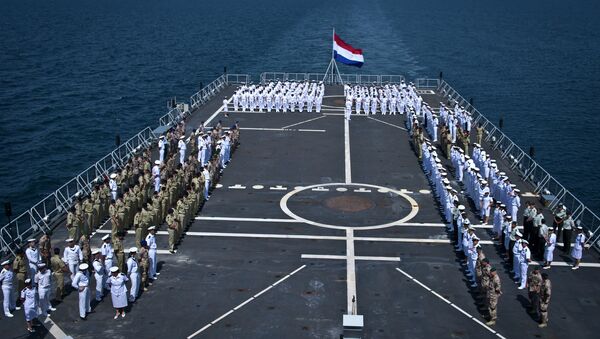The paper notes that the EU reputation is under risk if "loss of life is attributed, correctly or incorrectly, to action or inaction by the EU force".
The leaked documents also reveal plans to conduct military operations to destroy boats used for transporting migrants in Libyan territories to prevent them from reaching Europe.
The paper highlights that the EU member states’ military committee needs to "[draw] on the full range of surveillance, intelligence and information capabilities available to Member States and Partners, and supported by Brussels (inter alia EEAS [European External Action Service] Single Intelligence Analysis Capacity – SIAC)".
#EU Council decides to establish European naval force #EuNavForMed to fight agnst human traffickers in #Mediterranean pic.twitter.com/rHPSR0Dw5V
— La France dans l´UE (@RPFranceUE) May 18, 2015
The military action, which was approved by member states on 18th May has been criticized by human rights organizations who claim that the EU could be putting more migrants lives at risk with their plan to "disrupt the people smugglers business model" by sinking Libyan boats.
Thousands of refugees fleeing conflict in Syria, Eritrea, Afghanistan and North Africa attempt the perilous journey across the Mediterranean. The majority set sail from Libya where people smugglers make their money by exploiting migrants' desperation to reach Europe.
The military paper says that warships deployed to destroy the Libyan vessels will be in a difficult decision if they encounter migrants whose safety is at risk, because "preservation of human life at sea is a legal obligation under international law".
.@ItalianNavy Admiral Enrico #Credendino, from #Atalanta to the command of #EUnavforMed http://t.co/eLntduzKrA pic.twitter.com/aYWfkTfqKJ
— OnuItalia (@Onuitalia) May 19, 2015
Also revealed is the acknowledgment that EU military force could be used against groups such as ISIL "within the Libyan sovereign area".
"The threat to the force should be acknowledged, especially during activities such as boarding and when operating on land or in proximity to an unsecured coastline or during interaction with non-seaworthy vessels. The potential presence of hostile forces, extremists, or terrorists such as Da’esh [ISIL] should also be taken into consideration."
Spanish Warship ESPS Rayo Completes Her Deployment on #EUNAVFOR Operation Atalanta http://t.co/kiQ2FuXawH pic.twitter.com/ZtS0itp9Zc
— EUNAVFOR (@EUNAVFOR) May 15, 2015
EU country leaders are accused of having blood on their hands since the dramatic scaling back of search and rescue operations preventing migrants from drowning. However it appears that EU’s military strategy could have a similar legacy. Revealed in the leaked papers is the need for the EU to focus the rhetoric on disrupting the "migrant-smuggling business model".
"The information strategy should avoid suggesting that the focus is to rescue migrants at sea but emphasize that the aim of the operation is to disrupt the migrant-smuggling business model."
Since the 2011 EU-led NATO intervention to remove Gaddafi from power, there has been a sharp increase in the numbers of refugees travelling to Europe from Libya that become increasingly lawless allowing people smugglers to act with impunity.
In 2014, more than 170,000 people attempted to cross the Mediterranean Sea from Libya. As many as 20,000 people have drowned in the last decade.
The EU is preparing a UN Security Council resolution to allow the naval military intervention force, EUnavfor Med, to go ahead as planned. EUnavfor Med is to have three phrases: intelligence gathering, stopping and seizing boats and destroying boats and other assets. The leaked paper says: "consideration should be given in order to be prepared to adapt the operation or end it at phase two" if the UN says no.
UN Secretary General Ban Ki-moon is due in Brussels this week and will meet Federica Mogherini, the EU’s foreign and security policy coordinator on Wednesday.



